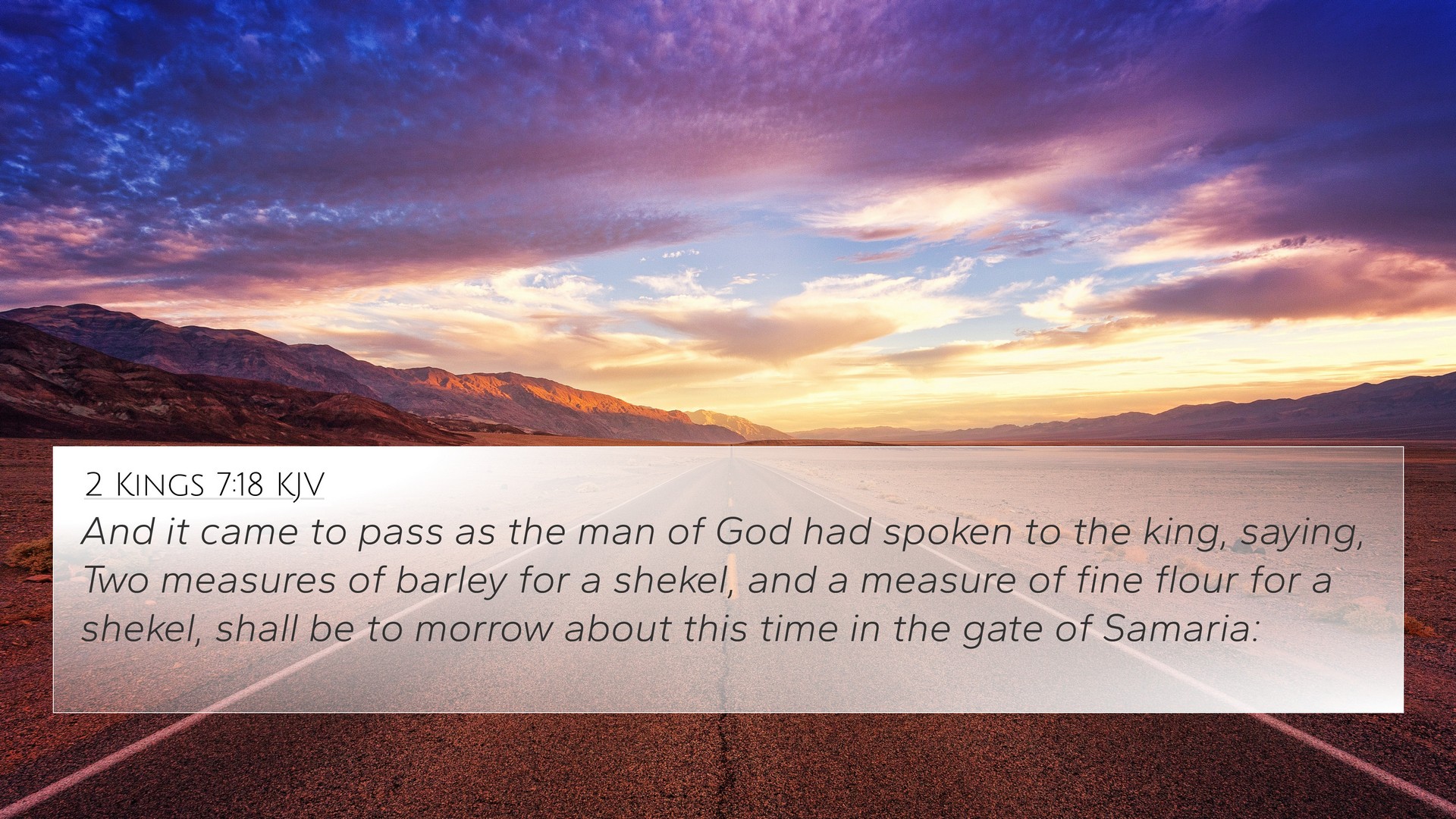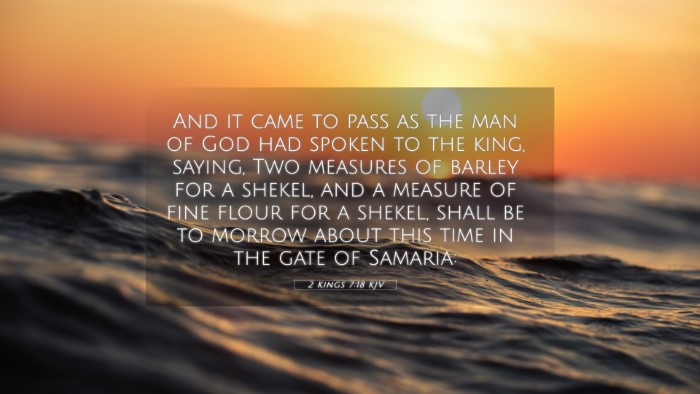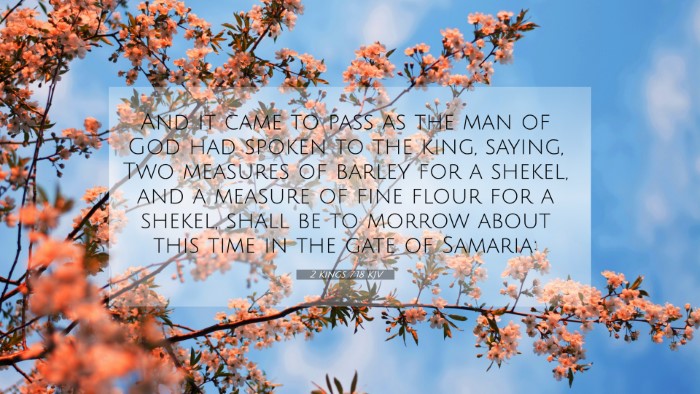Old Testament
Genesis Exodus Leviticus Numbers Deuteronomy Joshua Judges Ruth 1 Samuel 2 Samuel 1 Kings 2 Kings 1 Chronicles 2 Chronicles Ezra Nehemiah Esther Job Psalms Proverbs Ecclesiastes Song of Solomon Isaiah Jeremiah Lamentations Ezekiel Daniel Hosea Joel Amos Obadiah Jonah Micah Nahum Habakkuk Zephaniah Haggai Zechariah Malachi2 Kings 7:18 Similar Verses
2 Kings 7:18 Cross References
And it came to pass as the man of God had spoken to the king, saying, Two measures of barley for a shekel, and a measure of fine flour for a shekel, shall be to morrow about this time in the gate of Samaria:
Uncover the Rich Themes and Topics of This Bible Verse
Listed below are the Bible themes associated with 2 Kings 7:18. We invite you to explore each theme to gain deeper insights into the Scriptures.
2 Kings 7:18 Cross Reference Verses
This section features a detailed cross-reference designed to enrich your understanding of the Scriptures. Below, you will find carefully selected verses that echo the themes and teachings related to 2 Kings 7:18 KJV. Click on any image to explore detailed analyses of related Bible verses and uncover deeper theological insights.
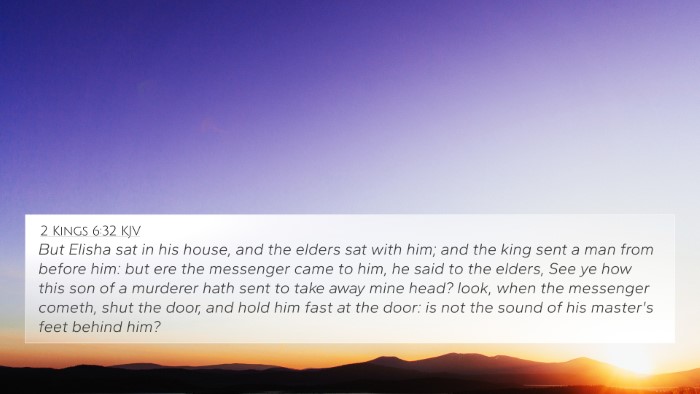
2 Kings 6:32 (KJV) »
But Elisha sat in his house, and the elders sat with him; and the king sent a man from before him: but ere the messenger came to him, he said to the elders, See ye how this son of a murderer hath sent to take away mine head? look, when the messenger cometh, shut the door, and hold him fast at the door: is not the sound of his master's feet behind him?
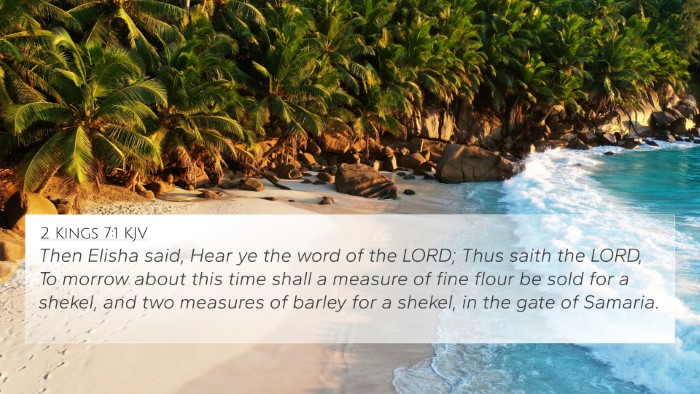
2 Kings 7:1 (KJV) »
Then Elisha said, Hear ye the word of the LORD; Thus saith the LORD, To morrow about this time shall a measure of fine flour be sold for a shekel, and two measures of barley for a shekel, in the gate of Samaria.
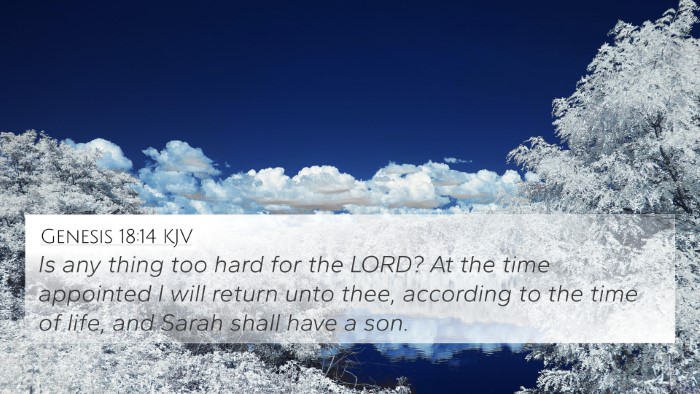
Genesis 18:14 (KJV) »
Is any thing too hard for the LORD? At the time appointed I will return unto thee, according to the time of life, and Sarah shall have a son.
2 Kings 7:18 Verse Analysis and Similar Verses
Understanding 2 Kings 7:18
2 Kings 7:18 states: "And it came to pass, as the man of God had spoken to the king, saying, Two measures of barley for a shekel, and a measure of fine flour for a shekel, shall be tomorrow about this time in the gate of Samaria." This verse exemplifies a significant moment in biblical prophecy and its fulfillment, highlighting God's sovereignty and the assurance of His word.
Verse Context
To properly understand this verse, it's essential to explore its context within the chapter. The backdrop involves a severe famine in Samaria, which led to desperation among the people. Amidst their plight, the prophet Elisha delivers a message of hope, declaring that abundance would return to the land, providing both encouragement and a prophetic forecast.
Commentary Insights
-
Matthew Henry's Commentary:
Henry emphasizes the miraculous provision announced by Elisha, contrasting it with the current state of despair. He points out that God's promises often exceed human understanding, showcasing His power to change circumstances dramatically and swiftly.
-
Albert Barnes' Notes:
Barnes highlights the significance of Elisha's words as they reveal God's intervention amid crisis. He connects this prophecy to God's covenantal faithfulness, noting that the promise of food becomes a symbol of spiritual sustenance and hope amidst physical starvation.
-
Adam Clarke's Commentary:
Clarke sheds light on the details of the prophecy itself, suggesting that the specific measures mentioned emphasize the sudden nature of God's blessings. He draws attention to the previous doubts expressed by a royal officer, which illustrates mankind's skepticism in the face of divine revelation.
Cross-References
This verse can be cross-referenced with several other biblical texts which reinforce its themes of prophecy, faith, and God's providence:
- 2 Kings 6:25-29: Describes the dire conditions in Samaria due to the famine.
- Isaiah 55:10-11: Discusses the nature of God's word and its effectiveness in accomplishing His purposes.
- Matthew 6:26: Affirms God's provision for His creation, illustrating His care during times of need.
- John 6:35: Jesus identifies Himself as the bread of life, linking physical sustenance with spiritual nourishment.
- Philippians 4:19: Promises that God will supply all needs, reinforcing the notion of divine provision.
- Psalm 37:25: "I have been young, and now am old; yet have I not seen the righteous forsaken, nor his seed begging bread."
- Lamentations 3:22-23: Emphasizes God's faithfulness and mercy, which are new every morning.
Thematic Connections
This verse highlights several overarching biblical themes:
- Divine Provision: It reinforces the principle that God provides for His people, both physically and spiritually.
- Faithfulness of God: The fulfillment of Elisha's prophecy illustrates God's unwavering faithfulness to His promises.
- Hope in Despair: In dire circumstances, God offers hope through His messengers and His word.
- Authority of Prophecy: Elisha's role reflects God’s willingness to speak into human situations and direct lives with authority.
Application and Reflection
When studying this verse, believers are encouraged to reflect on the nature of their faith in God's promises. It challenges readers to trust in the unseen provisions of God, especially during personal struggles or societal crises. Churches and ministries might consider using the insights from this scripture for sermon preparation and teaching, utilizing it as an example of God's continual care and guidance.
Conclusion
2 Kings 7:18 serves as a powerful reminder of God's ability to provide hope and sustenance when all seems lost. It encourages a deeper exploration of how biblical texts interlink, revealing God's consistent character and ongoing relationship with His people. Engaging with this verse and its broader scriptural implications invites deeper theological reflection and aids believers in recognizing the profound, interconnected nature of God's Word.
